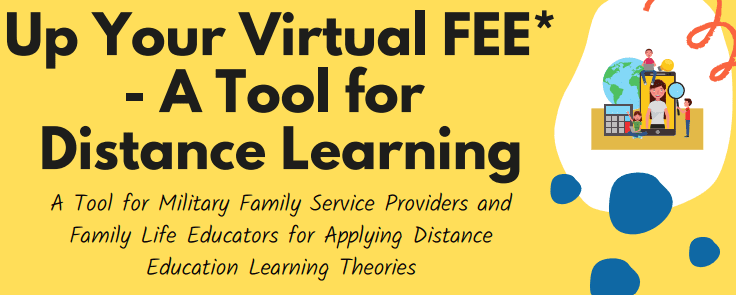By Karen Shirer, Ph.D.,
In the blink of an eye, COVID-19 changed the way that Military Family Service Providers (MFSPs) and Extension educators (EEs) engaged with military families. They went from face-to-face engagement to nearly all virtual engagement. The transition to a virtual environment will likely remain for the foreseeable future.
Most MFSPs and EEs quickly adapted to these new realities but also experienced frustrations and challenges. Many found that replicating face-to-face family engagement and education in a virtual environment didn’t always achieve the same outcomes.
For example, some practitioners were unfamiliar with the importance of social interaction with and between learners, and with the techniques and technology that could help socially engage learners in their virtual programs and meetings. Research and theory have both shown the value of social interaction for learners, such as, improved understanding and greater motivation to learn.
The pandemic continues with less intensity due to vaccines, face covering use and social distancing. MFSPs and EEs may want to assess and improve their virtual engagement and education with families during this time.
The OneOp Family Transitions (FT) team has developed a research-informed tool to assist MFSPs and EEs with these improvements. This tool, Up your Virtual FEE tool, gives best practices for planning and implementation of virtual family engagement and education (FEE).
You can learn more about the infographic’s background in this summary of an evaluation report. The paper was originally written to describe what was learned from an evaluation of the OneOp FT’s work. The framework was developed and used to assess the level of learner engagement in FT’s webinars and wrap-around resources like podcasts and blog posts, and to guide improvements in them.
With the changes brought on by the pandemic, the FT team wanted to translate what they learned into an tool so that others could benefit from our experience.
Take a moment to download the infographic and quickly review its content. It begins with a definition of what family engagement and education encompasses. The benefits of using learning theories are then briefly described. Three major learning theories are explained using the Community of Inquiry framework. Best practices for applying the learning theories before, during and after virtual FEEs are then given.
This tutorial provides information on how to use the Up your FEE tool. It includes a series of steps to guide you in applying the tool to your own virtual engagement with military families.
Key Takeaways
-
- COVID-19 has changed how we as MFSPs and EEs work with families and partners. Virtual family engagement and education (FEE) is the new norm. Embrace this transition!
- You can improve your virtual engagement by identifying a FEE’s goal and a learning theory that supports it, and then by applying best practices. Planning is key!
- When implementing a FEE, be flexible and reflect on what worked and what didn’t afterwards.
Tell us what you think about Up Your FEE. You can send me an email with your thoughts to [email protected].
References
Anderson, T. (13, March, 2020). Emergency Distance Education. Virtual Canuck: Teaching and Learning in a Net-Centered World.
De Felice, S., Vigliocco, G., & de C. Hamilton, A. F.. (2021). Social interaction is a catalyst for adult human learning in online contexts. Current Biology, Volume 31 (21), 4853-4859.e3. https://doi.org/10.1016/j.cub.2021.08.045
Garrison, R.. Cleveland-Innes, M. & Vaughn, M. (N.d.). Community of Inquiry. Athabasca University, CA.
Li, C. & Lalani, F. (29, April, 2021). The COVID-19 pandemic has changed education forever. This is how. World Economic Forum.
Okita S.Y. (2012) Social Interactions and Learning. In: Seel N.M. (eds) Encyclopedia of the Sciences of Learning. Springer, Boston, MA. https://doi.org/10.1007/978-1-4419-1428-6_1770
Plein, C. & Cassels, A. (2019) The Model Family Learning Network: A model for Extension-based virtual learniing communities. Journal of Extension, 57(6).
Poll Everywhere. (N.d.). 10 ways to improve student engagement in virtual learning.
The New Teachers Project. (2021). Engaging Families Virtually.
Writers Biography
 Karen Shirer, previous Associate Dean of the University of Minnesota Extension Center for Family Development. Karen is also the parent of two adult daughters, a grandmother, a spouse, and a cancer survivor.
Karen Shirer, previous Associate Dean of the University of Minnesota Extension Center for Family Development. Karen is also the parent of two adult daughters, a grandmother, a spouse, and a cancer survivor.















